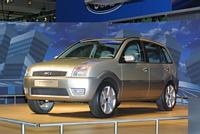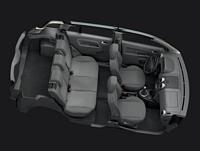GM and Ford Unveil Small But Tall Cars



DETROIT, Feb 28 Reuters reported that GM and Ford are targeting the growing market in Europe for cars that are small but tall, General Motors Corp. and Ford Motor Co. will unveil at the Geneva Auto Show next week competing vehicles that provide more spaciousness than popular hatchbacks.
The Ford Fusion and Opel Concept M from GM's European brand make their debut as both of the American automakers struggle to return to sustained profits in the competitive European market.
Both vehicles are just over four meters (157 inches) long, a few inches shorter than the Volkswagen AG Golf. But both are a few inches taller than the 1.4 meter (57 inch) tall Golf.
The so-called ``B'' size vehicles hit a growing part of the European market for affordable, fuel-efficient urban-size cars with space to carry passengers and their belongings comfortably. After the success of mid-size versions of the upright sedans, such as the Opel Zafira, the Renault Megane Scenic and Citroen Xsara Picasso, automakers are moving the concept into the small car segment.
``'B' lifestyle vehicles are going to be a big growth segment,'' said Jim Hall, an analyst with automotive industry consultants AutoPacific Inc. ``It's for somebody who wants a 'B' hatchback but would like a little extra room.''
Opel will also show at Geneva its roomier new Vectra mid-size car, one of the top-selling models in Europe, which suffers from its reputation as a fleet vehicle used only as a company car. The Vectra is a key product for Opel as it tries to revive its flagging image in Europe for selling dull cars.
``They (Ford and Opel) have had some pretty lousy products here,'' said Jim Collins, an analyst with UBS Securities in London. ``I think Ford is finally waking up, and GM is showing some signs of life.''
The Fusion and the Vectra are both expected to go on sale later this year in Europe. As its name suggests, the Concept M is strictly a concept now, but a similar vehicle from Opel and GM's Vauxhall brand in the United Kingdom, is expected to go on sale next year.
Ford officials have said a small number of Brazilian-made Fusions may be sold in North America, a move that has infuriated union officials in the wake of Ford's plans to shut five plants in the United States and Canada.
``If we start losing plants and they're planning on shipping from Brazil, they'll certainly see a major, major battle from us,'' Canadian Auto Workers President Basil ``Buzz'' Hargrove told Reuters earlier this month.
The product onslaught from Ford and Opel come as the two brands struggle to boost their image, shaken by their recent restructuring of operations, which resulted in the layoffs of thousands of workers across Europe.
Ford turned a minimal profit of $266 million from Europe last year, a return on sales of just 0.8 percent, below its target of a 1 percent return. GM Europe lost $767 million last year, up from a loss of $257 million in 2000. GM has said it hopes to halve its loss in Europe this year, and break even next year.
Both Ford and GM have suffered from overcapacity, downward pressures on vehicle pricing, and the trend toward smaller, less profitable vehicles.
Ford said earlier this month that it will cut 1,400 jobs, or about 15 percent of the work force, at its vehicle assembly plant in Genk, Belgium as part of its ongoing efforts to cut its European capacity.
Last week, a 70-year-long chapter in Britain's automotive history came to a close when the last car rolled off the line at Ford's giant Dagenham facility, two years after Ford said it would shift production of the Fiesta small car to Germany and Spain. Dagenham will instead produce diesel engines, cutting 1,100 jobs in the process.
Opel is behind Ford in its own restructuring. Its ``Project Olympia'' plan includes cuts of thousands of jobs in Europe, including 2,500 at plants in Germany by 2003 and 900 jobs at its plant in Antwerp, Belgium.
``It's a tale of sliding market share and chronic overcapacity which hasn't yet been sorted out,'' one London-based automotive analyst said. ``Project Olympia is going a long way toward fixing that, but we're only just now starting that, and that's going to be slow.''


